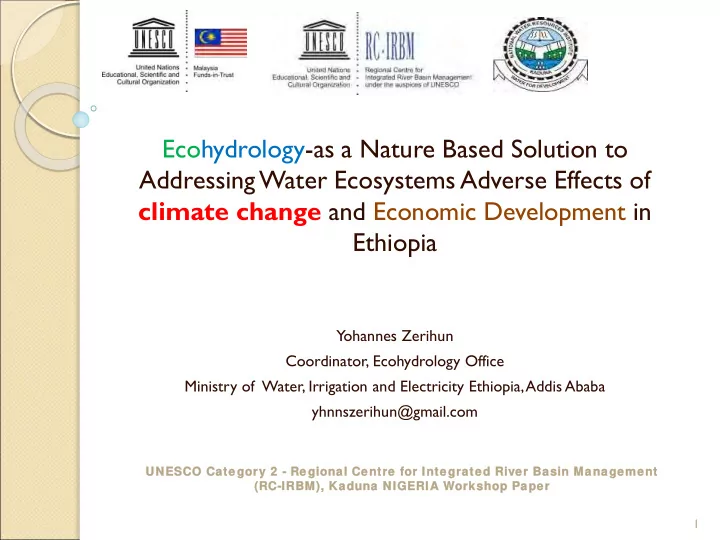

Ecohydrology-as a Nature Based Solution to Addressing Water Ecosystems Adverse Effects of climate change and Economic Development in Ethiopia Yohannes Zerihun Coordinator, Ecohydrology Office Ministry of Water, Irrigation and Electricity Ethiopia, Addis Ababa yhnnszerihun@gmail.com UNE UNESCO SCO Ca Category y 2 2 - Region ional l Ce Centre for Inte Integrated Riv River Ba Basi sin Manageme ment (R (RC-IRB IRBM), ), Kaduna NIGE IGERIA RIA W Worksho shop Paper 1
CONTENT Background & Introduction Policy Responses Implementation of IWRM & EH in Ethiopia African Regional Center for Ecohydrology Conclusion and Recommendations Acknowledgment
1.Introduction Location latitude 3 o and 15 o North and longitude 30 o and 48 o east. Area 1.2 million square kilometer. Altitudinal : 4620 masl at Ras Dashen in the Ertale volcano Semien (freezing temperature) 160mbsl at in the Dallol Depression ( ≥ 60 0 c) 3
about 50 percent of African mountains above 2,000 meters, are in Ethiopia 50% of the total area is mountainous 95% of the total arable land 90% of the total population and 60% of livestock 4
33 Agroecological zones(AEZs) of Ethiopia The basic ecological elements : climate, physiography, soils, vegetation, farming systems , etc (Source: MoA, 2000) 5
12 major river basins (123B m3/y) Ground water resources 28Bm3/y Wetlands covers an area of 13,699 km2 or 1.14% of the country’s land surface UNESCO Category 2 - Regional Centre for Integrated River Basin Management (RC-IRBM), Kaduna, NIGERIA Workshop Papers 6
Ethiopia’s primary water resource management challenges are its extreme hydrological variability and seasonality and the international nature of its most significant surface water resources. Variability is most obviously manifest in endemic, devastating droughts and floods. Less apparent is the broad range of impacts variability and seasonality have on the Ethiopian economy, even in good rainfall years. UNESCO Category 2 - Regional Centre for Integrated River Basin Management (RC-IRBM), Kaduna, NIGERIA Workshop Papers 7
Introduction BD hot Spot Water ES Status IUCN,2014
Ethiopia: Summary of Threats by ecosystems Source: Ethiopia’s Fifth National Report to the Convention on Biological Diversity
Environmental CHALLENGES in Ethiopia Terrestrial Ecosystems: Land degradation, • deforestation, • improper agricultural prac. • overgrazing, 10
Environmental Problems in Ethiopia Aquatic Ecosystems: Sedimentation Pollution Eutrophication Conversion of Wetland/Buffers into Agricultural, Urban and Industrial overgrazing, 11
Exacerbated By RFV Vs. GDP Flooding temperature Population
Sedimentation pollution, eutrophication , Overexploitation .
Historical Development of Main policies for WRM in Ethiopia in chronological order UNESCO Category 2 - Regional Centre for Integrated River Basin Management (RC-IRBM), Kaduna, NIGERIA Workshop Papers 14
EH
Implementation of EH & IWRM in Ethiopia UNESCO Category 2 - Regional Centre for Integrated River Basin Management (RC- IRBM), Kaduna, NIGERIA Workshop Papers 16
o IWRM Issues in Ethiopia o MoWIE o Basin High Council o Basin Authorities UNESCO Category 2 - Regional Centre for Integrated River Basin Management (RC-IRBM), Kaduna, NIGERIA 17 Workshop Papers
“Ecohydrology – a transdisciplinary science for integrated water resources and sustainable development in Ethiopia for the year 2008-2012” EH demo sites Capacity Building
Zalewski, 2009
Sediment trap potential: the upper figure shows the 2010 constracted checkdam; the lower figure – the result of sediments retained away from the reservoir After 6 months
Reduction of dioxin pollution with sedimentation- biofiltration system
BEA ASSELA BRANCH
Changing climatic variables and aggravating water deficit Drying air Hotter Mean Vapour Demand (MVD) air Mean annual air temperature in the Gumera (WVD) in Gumera basin, Ethiopia, in the basin, Ethiopia, in the period 1971-1999. period 1970-1999 . Stable Drying land rainfall Long term Gumera River annual Precipitation (mm) around Debretabor discharges in the period 1959-2006 (head water) in the period 1980-2006 Source: Kędziora A. 2011, modified
ECOLOGICAL AND HYDROLOGICAL FUNCTION OF THE LANDSCAPE Evaporation is energy consuming process (2,45 MJ/kg H 2 O).
Application of biodegradable geotextile for the rehabilitation of degraded land in Lake Tana catchment – Gum / Rib Rivers 1 2 6 months later 4 3
Ecotone integrated with and check dam
Ecological Engineering for water, biodiversity society at Lake Tana Littoral Zone (Zenzelima Kebele ) Echiochloa Farming up to the ( ሻፍሪ ) edge of the Lake Increased CC (water(qual. &quan.), biodiversity, ES &SE) Co2 sequestration High milk No CO2 emission/ productivity Green energy/
Awareness Creation Ecohydrology Avoid Synergy as a new tool for duplication Integrated Watershed Management scenario-based planning
Multidisciplinary Team Composition • University • Ministry of Agriculture • Regional Bureau of Agriculture • Research Centers • City Administration • Private sector • Fishers • Local people • MoWIE Coordinator
African Regional Center for Ecohydrology (ARCE) u/a of UNESCO 2 nd Intl. EH Symposium 30
Practical Knowledge Sharing on Ecohydrological Systemic Solution UNESCO Category 2 - Regional Centre for Integrated River Basin Management (RC- IRBM), Kaduna, NIGERIA Workshop Papers 31
Conclusions 1. In the face of demographic and climate change and economic development conservation is not enough. Carrying capacity of ecosystems need to be enhanced and, to this end, appropriate mechanism must be put in place which is a nature based Transdisciplinary science - Ecohydrology 2. Strong cooperation among water related center, to put into practice Ecohydrology, is crucial
Traditional and new integrative education model of environmental and sustainability scientists and engineers necessary for achieving sustainable development [based on concepts described in Zalewski (2013)]
THANK YOU 34
Recommend
More recommend